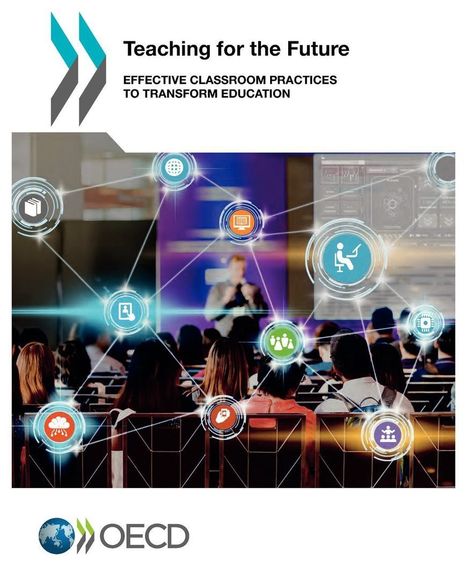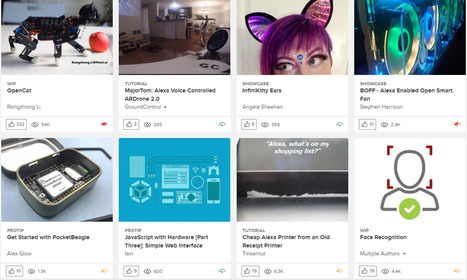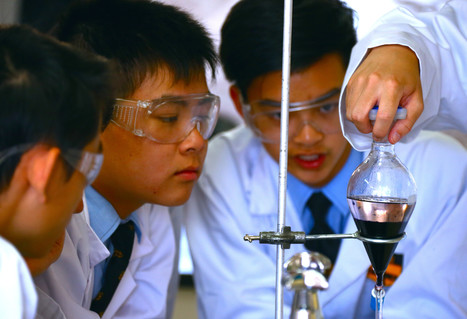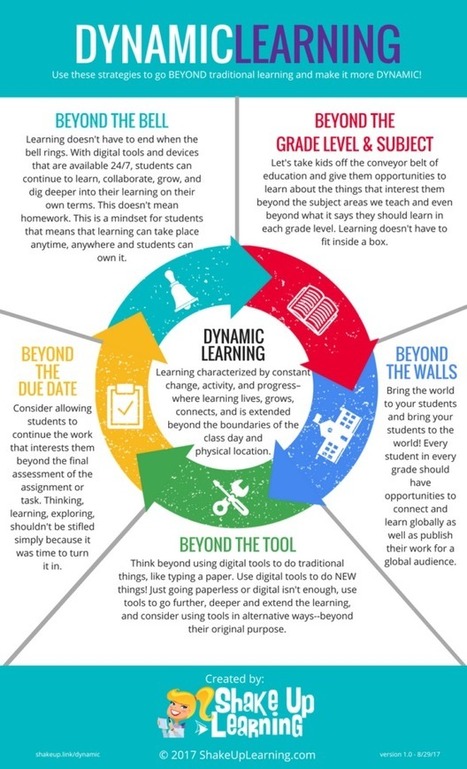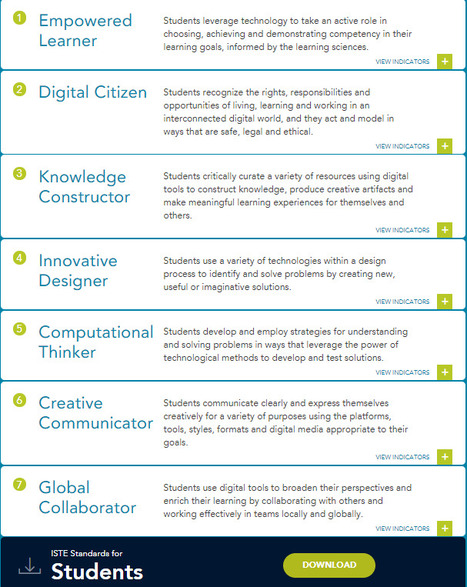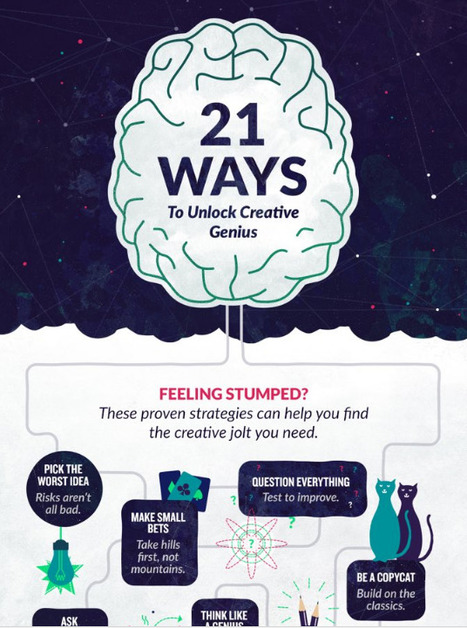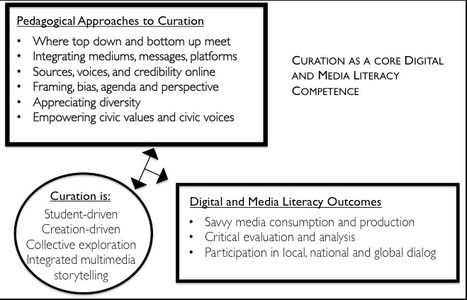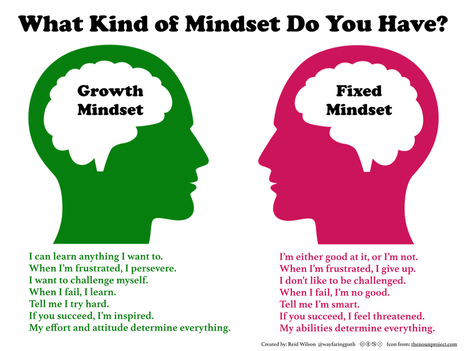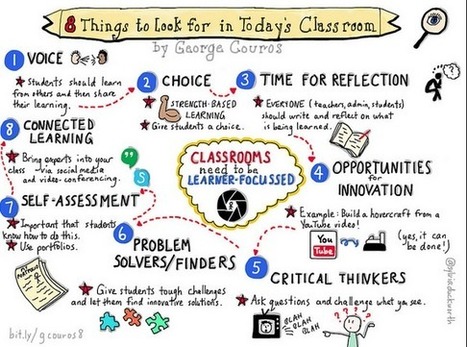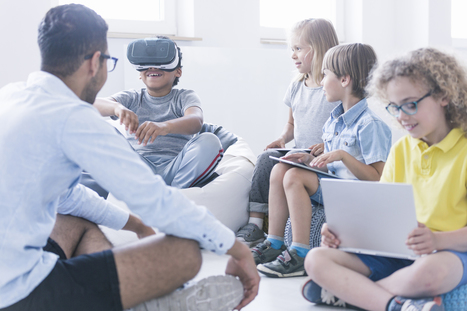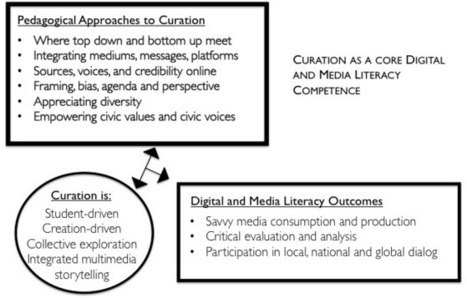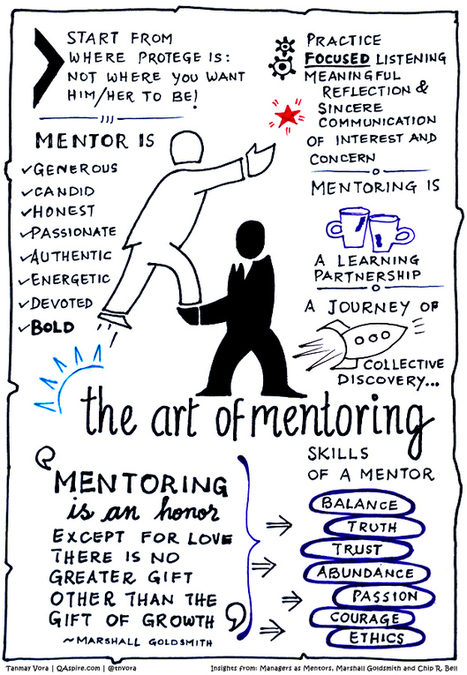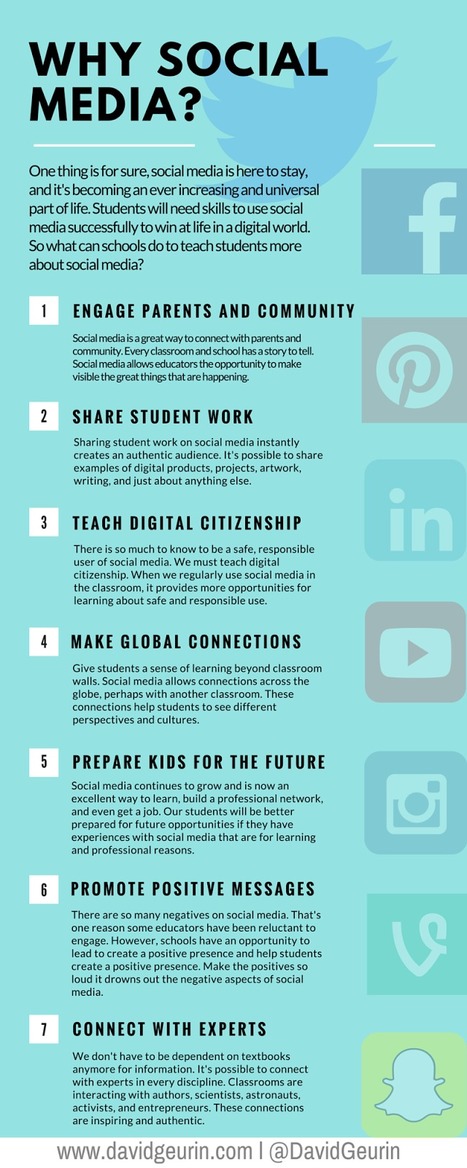 Your new post is loading...
 Your new post is loading...

|
Rescooped by
Jim Lerman
from Technology
March 24, 2018 7:56 PM
|

|
Rescooped by
Jim Lerman
from Cultivating Creativity
March 2, 2018 12:08 AM
|

|
Rescooped by
Jim Lerman
from 21st Century Learning and Teaching
February 25, 2018 7:04 PM
|
Education may be the passport to the future, but for all the good teaching out there, it would seem that schools are failing to impart some of the most important life skills, according to one educational expert.
Dr. Tony Wagner, co-director of Harvard's Change Leadership Group, argues that today’s school children are facing a “global achievement gap”, which is the gap between what even the best schools are teaching and the skills young people need to learn.
This has been exacerbated by two colliding trends: firstly, the global shift from an industrial economy to a knowledge economy, and secondly, the way in which today’s school children – brought up with the internet – are motivated to learn.
In his book The Global Achievement Gap, Wagner identifies seven core competencies every child needs in order to survive in the coming world of work.
1. Critical thinking and problem-solving 2. Collaboration across networks and leading by influence 3. Agility and adaptability 4. Initiative and entrepreneurialism 5. Effective oral and written communication 6. Accessing and analysing information
Via Gust MEES

|
Rescooped by
Jim Lerman
from 21st Century Learning and Teaching
September 18, 2017 9:34 AM
|

|
Rescooped by
Jim Lerman
from Instructional Technology
October 31, 2017 8:39 PM
|
Promote future-ready learning with the ISTE Standards for Students Today’s students must be prepared to thrive in a constantly evolving technological landscape. The ISTE Standards for Students are designed to empower student voice and ensure that learning is a student-driven process. Connect with other educators in the ISTE Standards Community and learn how to use the standards in the classroom with the ISTE Standards for Students ebook. Learn more / En savoir plus / Mehr erfahren: http://www.scoop.it/t/21st-century-learning-and-teaching/?&tag=ISTE
Via Gust MEES, Sharon Murdoch

|
Rescooped by
Jim Lerman
from E-Learning-Inclusivo (Mashup)
August 4, 2017 7:29 AM
|

|
Rescooped by
Jim Lerman
from Effective Education
September 2, 2017 8:21 PM
|
21 ways to unlock creative genius | #Creativity #Infographic
An idea that is beginning to gain a lot of favour in educational circles at the moment is the notion of fixed versus growth mindsets, and how they might relate to students and learning. Based on the work of Stanford University psychologist, Carol Dweck, the idea of mindset is related to our understanding of where ability comes from. It has recently been seized upon by educators as a tool to explore our knowledge of student achievement, and ways that such achievement might be improved. Learn more / En savoir plus / Mehr erfahren: http://www.scoop.it/t/21st-century-learning-and-teaching/?&tag=Growth+Mindset
Via Gust MEES

|
Rescooped by
Jim Lerman
from 21st Century Learning and Teaching
February 16, 2017 12:18 AM
|
21 ways to unlock creative genius | #Creativity #Infographic

|
Rescooped by
Jim Lerman
from KILUVU
January 29, 2017 11:09 AM
|
|
The classroom of the future, according to the world’s best teachers
By Global Teacher Prize | March 2nd 2018
In many parts of the world, today’s classrooms are almost unrecognisable compared to those of a decade ago.
Technology is changing the way students learn and teachers teach. From interactive white boards replacing chalk boards to tablets replacing desktop computers, schools are becoming increasingly digital.
Looking ahead to 2030, greater internet connectivity and smarter technologies promise to radically reshape the classroom of the future.
We asked the Global Teacher Prize 2018 Finalists to share their views on how they feel the classroom will change in the coming decade, and what this means for the role of the teacher.
What do you think will be the biggest difference between the classroom of 2030 and the classroom of today?
Many of our Finalists predict that the trend of young people effectively teaching themselves will continue. Learn more / En savoir plus / Mehr erfahren: https://www.scoop.it/t/21st-century-learning-and-teaching/
Via Gust MEES
In today’s hypermedia landscape, youth and young adults are increasingly using social media platforms, online aggregators and mobile applications for daily information use. Communication educators, armed with a host of free, easy-to-use online tools, have the ability to create dynamic approaches to teaching and learning about information and communication flow online. In this paper we explore the concept of curation as a student- and creation-driven pedagogical tool to enhance digital and media literacy education. We present a theoretical justification for curation and present six key ways that curation can be used to teach about critical thinking, analysis and expression online. We utilize a case study of the digital curation platform Storify to explore how curation works in the classroom, and present a framework that integrates curation pedagogy into core media literacy education learning outcomes. Learn more / En savoir plus / Mehr erfahren: https://gustmees.wordpress.com/?s=curation https://globaleducationandsocialmedia.wordpress.com/2014/01/19/pkm-personal-professional-knowledge-management/
Via Gust MEES

|
Rescooped by
Jim Lerman
from 21st Century Learning and Teaching
November 21, 2017 11:31 AM
|

|
Rescooped by
Jim Lerman
from Learning with Technology
September 15, 2017 8:16 PM
|
Preparing a child for the world that doesn’t yet exist is not an easy task for any teacher. Step back and look at that picture from a broad perspective. What are the critical 21st-century skills every learner needs to survive and succeed in our world? What abilities and traits will serve them in a time that’s changing and developing so rapidly?
They want to be challenged and inspired in their learning. They want to collaborate and work with their peers. They want to incorporate the technology they love into their classroom experiences as much as they can. In short, they have just as high a set of expectations of their educators as their educators have of them.
How Are Educators Responding?
The Australian Curriculum Assessment and Reporting Authority, (ACARA), have identified the following as the General Capabilities they see as essential for learners:
Critical and creative thinking
Personal and social capability
Ethical understanding
Intercultural understanding
Information and communication technology capability
Literacy
Numeracy
Learn more / En savoir plus / Mehr erfahren. http://www.scoop.it/t/21st-century-learning-and-teaching/?&tag=modern-education
Via Gust MEES, NextLearning

|
Rescooped by
Jim Lerman
from Scriveners' Trappings
August 4, 2017 7:54 AM
|
A new study lends credence to what you’ve probably always suspected: social media is having a pretty negative effect on teenagers — Instagram and Snapchat being the worst culprits. The study, published today and called “Status of Mind,” was conducted by researchers for the Royal Society for Public Health in the UK. The researchers surveyed 1,479 British youths ages 14-24, asking them how they felt the different social media networks effected their mental health. They took in several factors such as body image, sleep deprivation, bullying, and self-identity. The results suggest the two worst social media networks for kids are Instagram and Snapchat, as they had terrible scores for body image, bullying, and anxiety. Twitter and Facebook weren’t much better, though. YouTube was the only one that apparently inspired more positive feelings than negative ones. Learn more / En savoir plus / Mehr erfahren: http://www.scoop.it/t/social-media-and-its-influence
Via Gust MEES, Jim Lerman

|
Rescooped by
Jim Lerman
from :: The 4th Era ::
July 26, 2017 9:11 AM
|
It is almost universally acknowledged that in order to succeed in the 21st century, students must learn much more than the “three Rs” and basic computer competency. The term “21st century skills” is used often in educational circles to refer to a range of abilities and competencies that go beyond what has traditionally been taught in the classroom, including problem solving, communication, collaboration, creativity and innovation. Others define the term as “information literacy, media literacy, and information, communication and technology literacy.” More importantly, students need these skills because employers across a huge variety of industries increasingly demand them. A recent McKinsey report indicated that close to 40 percent of employers could not find people with the right skills while 60 percent “complain[ed] of a lack of preparation.” Even jobs that were once considered vocational, such as welding, petroleum production, and even factory work, are now high tech, and require specialized knowledge that includes not only a robust science background and familiarity with the computerized machinery that keeps heavy industry humming, but also critical thinking and collaboration skills. In other words, 21st century job growth is outpacing our ability to develop a prepared workforce, making it more critical than ever to teach these skills. Learn more / En savoir plus / Mehr erfahren: https://gustmees.wordpress.com/2015/07/19/learning-path-for-professional-21st-century-learning-by-ict-practice/ https://gustmees.wordpress.com/2015/10/29/if-i-would-own-a-company-what-skills-would-i-expect-from-my-workers-in-21st-century/
Via Gust MEES, Jim Lerman
Teacher professional learning is of increasing interest as one way to support the increasingly complex skills students need to learn in preparation for further education and work in the 21st century. Sophisticated forms of teaching are needed to develop student competencies such as deep mastery of challenging content, critical thinking, complex problem-solving, effective communication and collaboration, and self-direction. In turn, effective professional development (PD) is needed to help teachers learn and refine the pedagogies required to teach these skills. However, research has shown that many PD initiatives appear ineffective in supporting changes in teacher practices and student learning. Accordingly, we set out to discover the features of effective PD. This paper reviews 35 methodologically rigorous studies that have demonstrated a positive link between teacher professional development, teaching practices, and student outcomes. We identify the features of these approaches and offer rich descriptions of these models to inform those seeking to understand the nature of the initiatives. Learn more / En savoir plus / Mehr erfahren: https://gustmees.wordpress.com/?s=coaching https://gustmees.wordpress.com/?s=professional+development
Via Gust MEES

|
Rescooped by
Jim Lerman
from :: The 4th Era ::
March 25, 2017 1:38 PM
|
What is professional development? It is pretty much anything that helps one develop professionally. At the heart, professional development is about growth and learning. In the field of education, it seems like many quickly think of educational opportunities that mimic what they see in their schools. As a result, they turn professional learning and education into schooling. The problem with that is that schooling is too limiting. In this age, there are many other exciting and high-impact learning opportunities for teachers that extend beyond traditional notions of schooling. When we hear the phrase “professional development,” certain practices likely come to mind, things like in-services and conferences. In the digital age, there are countless other opportunities for professional development and restricting one’s thoughts to just a few options limits our insight into what is possible for our students. With that in mind, here is a brainstorm of 20 options available to educators today. This is far from an exhaustive list, but it is enough to start exploring the possibilities. Feel free to suggest others in a comment to this post. Learn more: Professional Development: WHY EDUcators And TEACHers Can’t Catch UP THAT Quickly AND How-To Change It LEARNing To LEARN For MY Professional Development | I Did It MY Way
Via Gust MEES, Jim Lerman

|
Rescooped by
Jim Lerman
from 21st Century Learning and Teaching
February 7, 2017 6:37 PM
|

|
Rescooped by
Jim Lerman
from 21st Century Learning and Teaching
February 16, 2017 12:21 AM
|
21 ways to unlock creative genius | #Creativity #Infographic
|



 Your new post is loading...
Your new post is loading...

